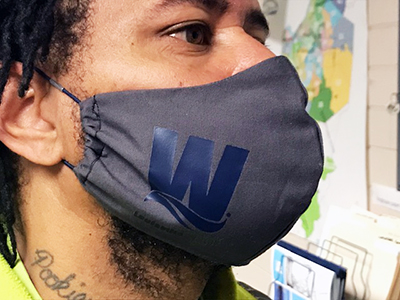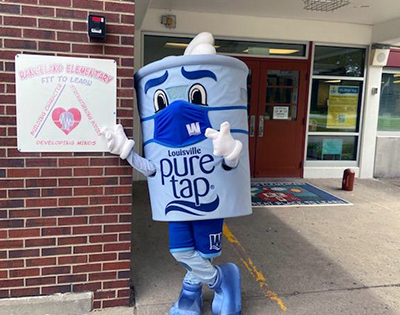 Before 2020, working at Louisville Water Company looked like any other corporate environment. Employees were expected to be in the office five days a week, meetings were held in person, and shared spaces were all too common.
Before 2020, working at Louisville Water Company looked like any other corporate environment. Employees were expected to be in the office five days a week, meetings were held in person, and shared spaces were all too common.
Today, Louisville Water looks a little different.
As we mark five years this month since the start of the COVID-19 pandemic, we’re reflecting on how it transformed the way we work at Louisville Water. COVID-19 thrust everyone into a brand-new world of doing things, learning as we went.
What once seemed impossible or strange is now widely accepted. Many employees have the choice of a flexible, hybrid work schedule, and virtual communication tools allow us to collaborate with someone miles away.
Innovative technologies and policies
On March 25, 2020, Kentucky Governor Andy Beshear signed an executive order prohibiting “in-person work that is not necessary to protect or sustain life.”
Since drinking water is a necessity and function of public health, this order was a little trickier to institute at Louisville Water. The Third Street corporate office closed to the public and downtown employees worked from home, while field crews and water quality team members adjusted their schedules to perform their essential work safely.
“IT went into high gear and helped people gain remote access, helped people get set up who may have not had a laptop at that point in time,” said Terrence Spence, Louisville Water Vice President of Human Resources.
The executive leadership team met virtually three times a week to discuss policy changes. Louisville Water President Spencer Bruce sent weekly emails to the entire company with health updates and recommendations from the CDC and Metro Health Department.
 The health updates were not only for the employees but their families, too.
The health updates were not only for the employees but their families, too.
“One of the other things that came out of the (pandemic) was the focus on employees’ mental health,” said Spence. “When folks were sent home and basically isolated, there were stressors and anxieties that grew out of that.”
Louisville Water offered employee assistance programs, handed out masks and sanitizer, and implemented an emergency paid leave policy, providing employees with 10 additional days of sick leave if an employee contracted or was exposed to COVID-19.
“I think the effort to inform employees that we were interested in their well-being and their family’s well-being came through more than anything else,” said Spence.
A new “normal”
The departments at Louisville Water started to take many different shapes.
For Louisville Water Customer Service Trainer Angela Garnett, her role changed in that she couldn’t host in-person trainings, but she could meet with her fellow agents virtually one-on-one. She said the trainings became more effective with the individual attention and ability to share her screen.
 Field crews, lab technicians, lead operators and metering specialists continued to work on-site but kept their distance by driving in separate vehicles and limiting the number of people in each room.
Field crews, lab technicians, lead operators and metering specialists continued to work on-site but kept their distance by driving in separate vehicles and limiting the number of people in each room.
Nate Frederick, Louisville Water Metering Specialist, said he remembers putting signs on their trucks encouraging customers to practice social distancing while on worksites.
“That was difficult because our job is to interact with the customer,” Frederick said.
Imagine trying to explain an issue to a customer without being able to show them the meter or stand next to them. “It was tough,” he said.
Frederick said while the separation from the customer and each other was challenging, it may have brought everybody at Louisville Water’s Allmond Avenue location a little bit closer.
“You didn’t realize how much you maybe missed talking to a person or interacting with a person until you were forced to do so,” he said.
The customer service team felt the same way, so they started a group chat to stay connected, which they still use to this day.
“We all learned to work together,” Garnett said. “We understood the value of respecting everyone. And I think we came a little bit closer during that time, because we were all helping each other.”
Becoming an employer of choice
 What became clear during the pandemic more than anything was the need for flexibility.
What became clear during the pandemic more than anything was the need for flexibility.
Spence said the pandemic forced the company to look at their “employer of choice” model and reimagine the workspace. They recognized employees were juggling more than just work – they were helping sick family members, caring for their children full-time while schools and daycares were closed, and still balancing daily routines.
Offering a remote work option became the new norm and an appealing benefit to job applicants.
Answering with empathy
The pandemic caused a ripple effect; companies closed or downsized, people lost their jobs, and many struggled to make ends meet.

“We knew the economic impact that this (was) having on individuals,” said Spence. “So, there were no turnoffs from a utility perspective. Why? Because what is the most needed element? Water. That’s sanitary, that’s how you eat, clean, sleep, all those things.”
This need spurred the creation of Drops of Kindness℠, a customer assistance program in partnership with Louisville Water and Louisville MSD to help families meet financial challenges.
In 2021, Drops of Kindness provided more than $9 million in assistance to nearly 25,000 customers.
While the pandemic forced distance between everyone, it united Louisville Water in many other ways. Adjusting along the way allowed growth for the future.
“Being able to come together after COVID was done, it felt like a celebration,” said Frederick.

